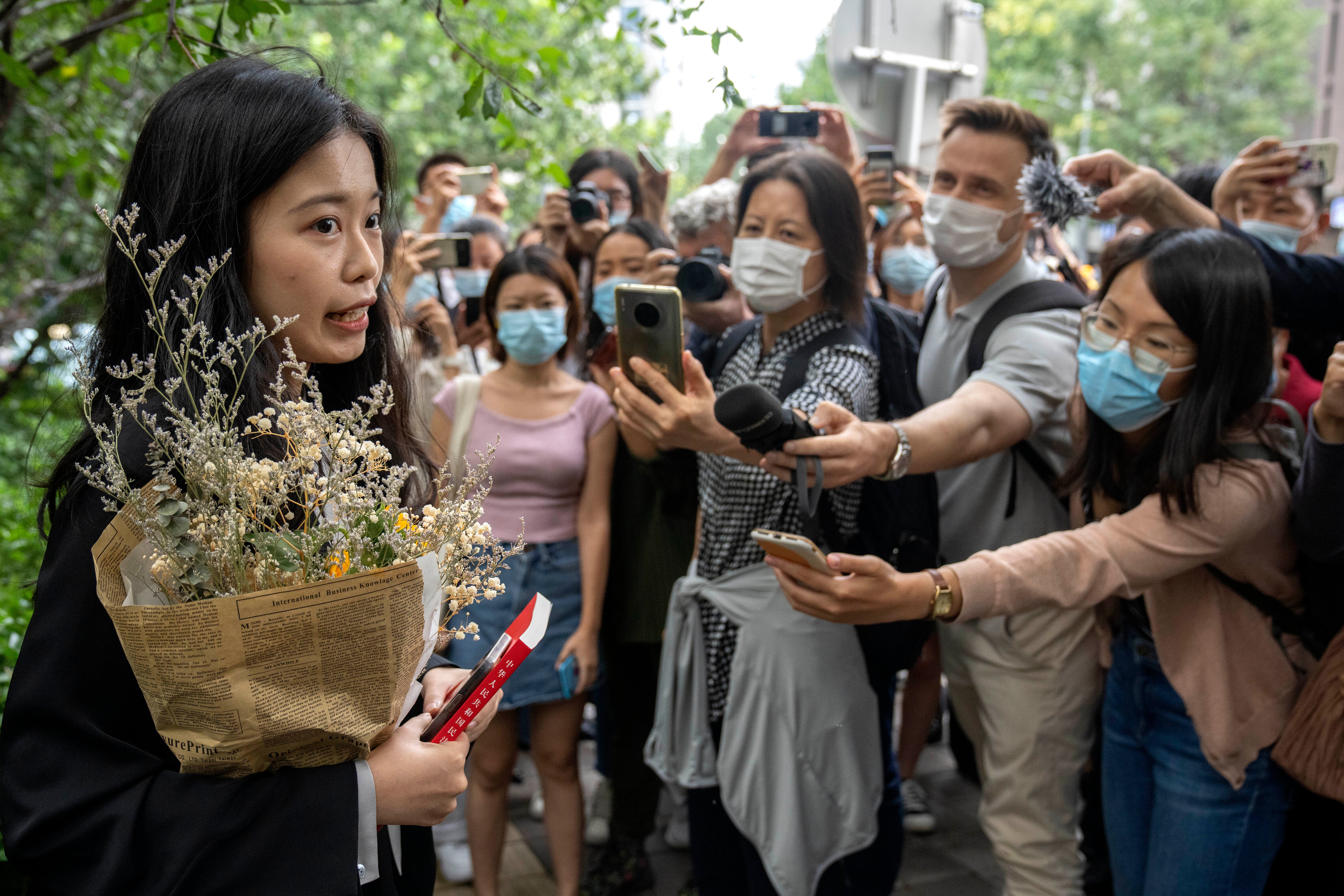Bystanders harass Chinese woman going public in #MeToo case
A Chinese woman has been shoved by antagonistic bystanders as she headed to court in one of the few remaining #MeToo cases from a tamped-down movement whose legacy remains uncertain

Your support helps us to tell the story
From reproductive rights to climate change to Big Tech, The Independent is on the ground when the story is developing. Whether it's investigating the financials of Elon Musk's pro-Trump PAC or producing our latest documentary, 'The A Word', which shines a light on the American women fighting for reproductive rights, we know how important it is to parse out the facts from the messaging.
At such a critical moment in US history, we need reporters on the ground. Your donation allows us to keep sending journalists to speak to both sides of the story.
The Independent is trusted by Americans across the entire political spectrum. And unlike many other quality news outlets, we choose not to lock Americans out of our reporting and analysis with paywalls. We believe quality journalism should be available to everyone, paid for by those who can afford it.
Your support makes all the difference.A Chinese woman was shoved by antagonistic bystanders as she headed to court Tuesday in one of the few remaining #MeToo cases from a tamped-down movement whose legacy remains uncertain.
Zhou Xiaoxuan, a former intern at Chinese state broadcaster CCTV, became the face of the country's #MeToo movement after going public with accusations against a prominent CCTV host in 2018. Since then, the movement has been largely shut down by authorities as activists found their online posts censored and faced pressure from authorities when trying to hold protests, but Zhou has continued to speak out.
“I'm very thankful for everyone, whether we win or lose, I'm very honored to have experienced these last three years,” Zhou said to reporters outside the court, as unidentified men and women came up and tried to push her along.
One woman yelled “pandemic safety," trying to prevent Zhou from speaking, while a man questioned whether it was appropriate for her to speak alone.
A young man who tried to hold up a sign saying “Standing Together” was quickly surrounded by police and had the sign ripped out of his hand. He said later that the police then asked for his national identification number.
The hearing was the final one in a lawsuit brought by Zhou against CCTV host Zhu Jun, whom she accuses of groping and forcibly kissing her in 2014. She is asking for a public apology as well as 50,000 yuan ($7,600) in damages.
While the movement no longer has protests and lawyers and others helping victims take legal action, some people are still pushing to get justice for victims of sexual violence, even if they do not cite the #MeToo label.
A series of sexual assault and rape accusations in recent weeks has drawn national attention. The most prominent was an accusation of sexual assault made by an Alibaba employee against two men. Chinese-Canadian singer Kris Wu was also arrested in Beijing on suspicion of rape over accusations made online.
In August, accusations posted online by victims led separately to the detention of a math teacher on charges of forcible molestation and the firing of a popular TV host at Hunan Television. Shanghai police, who initially declined to press charges in the latter case, have said they have reopened the investigation.
“These incidents are a part of #MeToo, without a doubt,” said Lu Pin, the founder of Feminist Voices, an online publication that was shut down by censors in 2018. “Without #MeToo, it’s impossible to imagine these types of things coming out.”
After the #MeToo movement swept China, authorities responded with legal changes that activists and legal experts say have not yet led to real change on the ground. They defined sexual harassment in the country's civil code, a massive effort approved in 2020 that organized civil laws and promised certain rights to citizens.
Still, victims of sexual violence face legal and social obstacles to seeking justice.
“The messaging is quite strong ... and it's saying to people that this is going to change things,” said Darius Longarino, a research scholar at Yale Law School. “But on the ground, in the actual system, there’s still many pitfalls.”
In a recent report, Longarino and colleagues found only 83 civil cases in public databases that related to sexual harassment or molestation between 2018 and 2020. Of the 83 cases, 77 were brought by the alleged harasser against companies or the victim. Just six cases were brought by victims against a harasser.
Zhou's case lingered in the dockets for two years before a Beijing court agreed to hear it last December. The second part of the hearing, originally scheduled for May, was canceled on the day by the court.
Throughout, Zhou has pushed to make the court hearing a matter of public record and requested the court order Zhu Jun to appear, citing basic court procedures.
When she filed the suit in 2018, such complaints were treated as labor disputes or under other laws that didn’t relate directly to sexual harassment. Zhou’s was termed a “personality rights dispute.”
The court rejected a request by her lawyers to have her case heard under a legal provision enacted after she filed the suit that explicitly cites sexual harassment.
“I believe that justice in these basic procedures is a necessary path to take to get a fair result, and all the efforts we made before the hearing are not just for victory, but for a fundamental fairness,” Zhou wrote on her WeChat social media account on Monday.
___
Wu reported from Taipei, Taiwan. Associated Press news assistant Caroline Chen contributed to this report.